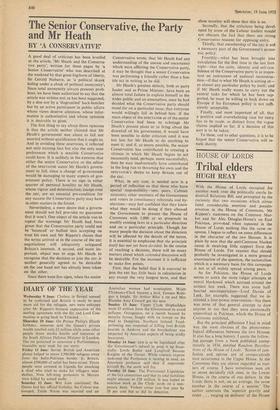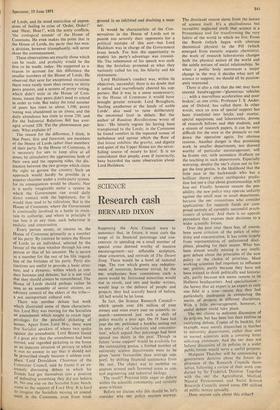HOUSE OF LORDS
Tribal elders
HUGH REAY
With the House of Lords occupied for another week over the politically sterile In- dustrial Relations Bill, and prompted by the curiosity that two occasions which stimu- lated considerable emotion and pseudo- emotion in the House of Commons, Mr Rippon's statement on the Common Mar- ket and Sir Alec Douglas-Home's on East Pakistan, provoked when repeated in the House of Lords nothing like the same re- sponse, I began to reflect on some differences in the character of the two Houses. It is plain by now that the anti-Common Market cause is receiving little support from the House of Lords. For reasons that should probably be investigated in a more general examination of the question, the nationalism which is a necessary basis for this campaign is not at all widely spread among peers.
As for Pakistan, the House of Lords seems to scorn the more vulgar attempts at moral blackmail which accrued around the subject last week. There was some half- hearted neo-imperialism--Lord Davies of Leek, for example, suggested that we in- stituted a four-power intervention—but there was none of that general attempt to dare anyone to say that they were emotionally uninvolved in Pakistan, which the House of Commons exhibited, But the principal difference I had in mind was the most obvious of the phenomeno- logical differences between the two Houses. It also has a long history. I quote the follow- ing passage from a book published anony- mously in 1836, entitled Random Recollec- tions of the House of Lords: 'Scenes of con- fusion and uproar are of comparatively rare occurrence in the Upper House. In the Commons they are almost regarded as mat- ters of course. I have sometimes seen six or seven decidedly rich ones, in the Lower House, in the course of one debate. In the Lords there is not, on an average, the same number in the course of a session.' The author contrasts the 'superior gravity and order . . . verging on dullness' of the House
of Lords, and its usual restriction of expres- sions of feeling to cries of 'Order, Order!' and 'Hear, Hear!', with the noisy conflicts, `the zoological sounds' of the House of Commons. He even makes the point that in the House of Lords, the party that has won a division, however triumphantly, will never cheer the announcement.
These observations are exactly those which can be made, and probably would be the first to be made, today. He suggested as a reason to account for this difference the smaller numbers of the House of Lords. He observed that save for exceptional occasions there were rarely more than twenty or thirty peers present, and a system of proxy voting, which didn't exist in the House of Com- mons, meant that peers didn't need to attend in order to vote. But today the total number of peers has risen to about 1,100, proxy voting was abandoned as an abuse, and the daily attendance has risen to some 250, and for the Industrial Relations Bill has aver- aged around 320. Yet the phenomenon per- sists. What explains it?
The reason for the difference, I think, is that Peers, first and foremost, are members of the House of Lords rather than members of their party. In the House of Commons, it is necessary for MPS to keep alive at all times, by stimulatir a the aggressions both of their own and the opposing sides, the dis- tinction between the two groups which claim the right to govern the country. Such an approach would hardly be possible in a popular chamber under a multi-party system, for its consequences would be chaotic. Nor is it easily imaginable under a system in which the Government can avoid daily direct contact with the legislature, for it would then tend to be ridiculous. But in the House of Commons, where the Government is continually involved in a battle to main- tain its authority, and where in principle it can lose it at any time, such behaviour is realistic and constructive.
Every person enters, or returns to, the House of Commons primarily as a member of his party. By contrast he enters the House of Lords as an individual, selected by the favour of the state whether through his own Person or that of his ancestor. He is secure as a member for the rest of his life, regard- less of the fortunes of his party. Party dis- tinctions are useful to provide a basic struc- ture, and a dynamic, within which to con- duct business and debates; but it is not vital that they should always be remembered. The House of Lords should perhaps rather be seen as an assembly of senior citizens, an advisory council of the elders of the tribe— a not unimportant cultural role.
There was another debate last week which illustrated some of these characteris- tics. Lord Hoy was moving for the Socialists an'amendment which sought to retain legal privileges for the peaceful picketing of homes. Apart from Lord Hoy, there were five Socialist speakers of whom two spoke against the amendment. Lord Brown found it a great pity that the amendment had been moved, and regarded picketing in the home as an indecent invasion of privacy to which it was no answer to say that it should not be proscribed simply because it seldom took place.- Lord Donaldson. Chairman of the Consumer Council, said he found it an ex- tremely distressing debate in which his friends had got themselves into a position of defending something they did not believe in. No one else on the Socialist front bench came to the support of Lord Hoy. It is hard to imagine the Socialists moving an amend- ment in the Commons, even from weak
ground in so inhibited and doubting a man- ner.
It would be characteristic of the Con- servatives in the House of Lords not to punish too severely their opponents for a political mistake of this sort—but Lord Hailsham was in charge of the Government front bench. For him the opportunity to exploit his party's advantage was irresisti- ble. The vehemence of his speech was such that the Socialists protested at what they variously called his ire, his hilarity and his riotousness.
Lord Hailsham's conduct was, within its objectives, successful; there is no doubt that it united and marvellously cheered his sup- porters. But it was in a sense unnecessary; in the House of Commons it would have brought greater rewards. Lord Brougham, 'hurling anathemas at the heads of noble Lords', also used to raise deliberately the emotional level in debate. But the author of Random Recollections wrote of him: 'He bitterly regrets his having been transplanted to the Lords; in the Commons he found comfort in the repeated scenes of turbulence and uproar which the floor of that house exhibits; the gravity, and dignity and quiet of the Upper House are the never- failing source of misery to him'. It is no coincidence that people, even if incorrectly, have hazarded the same observation about Lord Hailsham.



































 Previous page
Previous page